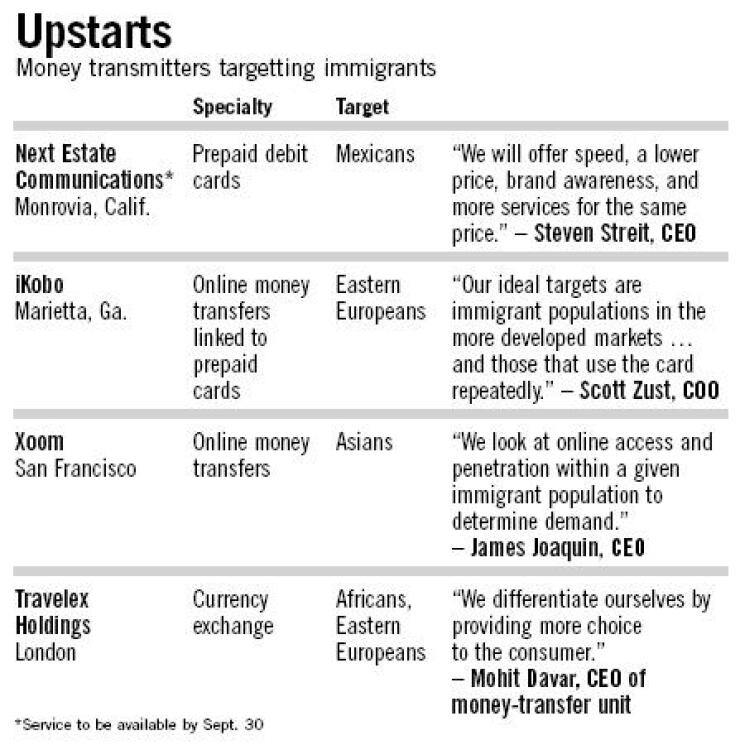
Niche companies, including prepaid card issuers and currency exchangers, have entered the remittance market by targeting specific immigrant groups, and more companies are planning to do the same.
The newcomers acknowledge they probably will not displace First Data Corp.’s Western Union Financial Services Inc. or MoneyGram International atop the remittance market. But analysts say the niche companies — as well as the large retailers that are entering the market — could keep banks from gaining market share, unless the banks also tailor their services to attract immigrants.
Next Estate Communications Inc., one of the largest marketers and developers of prepaid cards, will begin offering remittances by Sept. 30, and Steven Streit, its chief executive, said it plans to make a dent in the market.
“Western Union and MoneyGram are formidable companies,” Mr. Streit said. If Next Estate’s service “doesn’t have added value, it will get kicked off the shelf.”
He said his Monrovia, Calif., company’s service will be cheaper than those offered by the two large money transmitters and will be sold through Next Estate’s retail partners, including Rite Aid Corp., CVS Corp., Pathmark Stores Inc., and RadioShack Corp.
“We’re in every check-out aisle” of more than 35,000 stores, Mr. Streit said.
Analysts said IDT Corp., the largest U.S. distributor of prepaid phone cards, has been gathering money-transfer licenses and could be ready to couple its phone services with remittance services by this summer.
IDT, of Newark, N.J., pilot-tested money transfers to Mexico with Walgreen Co. last year, the analysts said.
“Given that they have the immigrant customers … it makes sense” for IDT to get into the remittance market, said Donna Jaegers, an analyst at Janco Partners Inc. of Englewood, Colo.
And having an in-house point of sale system for accepting and processing card transactions makes it easier for IDT to transfer funds abroad, she said.
IDT did not return calls seeking comment.
The remittance market is “a natural extension for prepaid phone [card] distributors,” said Dan Schatt, a senior analyst at Celent Communications LLC of Boston. “They have experience marketing cards to ethnic groups.”
Travelex Holdings Ltd., the London currency exchanger that owned 50% of MoneyGram until January 2003, says it has started to use the global network it built for exchanging currency and providing other services to send money, and it is working to expand that network.
Mohit Davar, the chief executive of Travelex Money Transfer, said his unit’s services are cheaper than Western Union’s and MoneyGram’s and provide a wider range of options.
Travelex can send money to a bank account, to Travelex Money Transfer outlets, or, in some countries, to the recipient’s home, and it is testing prepaid cards, Mr. Davar said.
“The potential is immense,” he said. “Our strength is that we are focused on the east — Africa and Eastern Europe — whereas a lot of the [U.S.] niche players are focused toward the south.”
Travelex partners with local banks, post offices, and retailers to tap into the trust people put in their communities.
Mr. Schatt said that is “a good strategy” for a remittance provider. “If you have someone from your local community to interact with, you’re feeling a lot more comfortable.”
Other companies are going after market share by customizing their technology to suit particular immigrant groups.
iKobo Inc. of Marietta, Ga., lets customers initiate fund transfers online. The money is loaded on to a Visa card, which is then mailed to the recipient.
Scott Zust, iKobo’s chief operating officer, said carrying a card is a sign of prestige in many countries. His 4-year-old company started by targeting affluent immigrants from the Caribbean.
“Our ideal targets are immigrant populations in the more developed markets … and those that use the card repeatedly,” Mr. Zust said.
The most frequent recipient countries for iKobo transactions are Romania, Russia, the Ukraine, and the Philippines, he said.
According to Celent, roughly 20% of all India-bound remittances are already done online. “Remitters are increasingly well-educated, online, affluent, and exposed to new technology,” Mr. Schatt said.
The San Francisco money transmitter Xoom Corp. has honed in on the Asia-Pacific market, particularly India and the Philippines, where it says the online-remittance trend has been particularly strong.
Xoom lets customers send money online using a bank account, a credit card, or a PayPal account. Recipients can pick up the cash at agent locations or, in certain countries, have it delivered to their door or deposited directly into a bank account.
James Joaquin, Xoom’s chief executive, said PayPal “trail blazed” online money transfers. “PayPal made it safe and accustomed people to sending money online,” he said.
Xoom researches levels of online access and Internet penetration among immigrant groups to determine where to market its services, Mr. Joaquin said.
“There’s a small but growing segment of senders that are online,” he said. “People are definitely realizing the opportunity out there.”
PayPal Inc., a San Jose unit of eBay Inc., processes money transfers for a number of remittance providers, and Mr. Schatt says it is in a good position to become a remittance provider itself.
Sara Bettencourt, a spokeswoman for PayPal, said it is watching the market “very closely” but currently has no plans to enter it.
Retailers are also starting to offer remittance services as well as payroll check processing to immigrants. For example, Albertsons Inc., which operates the Shaws and Acme Market grocery chains, provides money transfer services, as does Wal-Mart Stores Inc.
“A lot of interesting players are going to come out of the woodwork,” Mr. Schatt said.
And by failing to tailor their offerings to make them attractive to immigrants, banks are “missing the boat,” he said. Immigrants who would like to use banks for money transfers, for example, are still walking across the street to Western Union to send money. “They have not been marketed anything better.”
Banks should make sending money “as easy as it is to pay your bills online” Mr. Schatt said.





